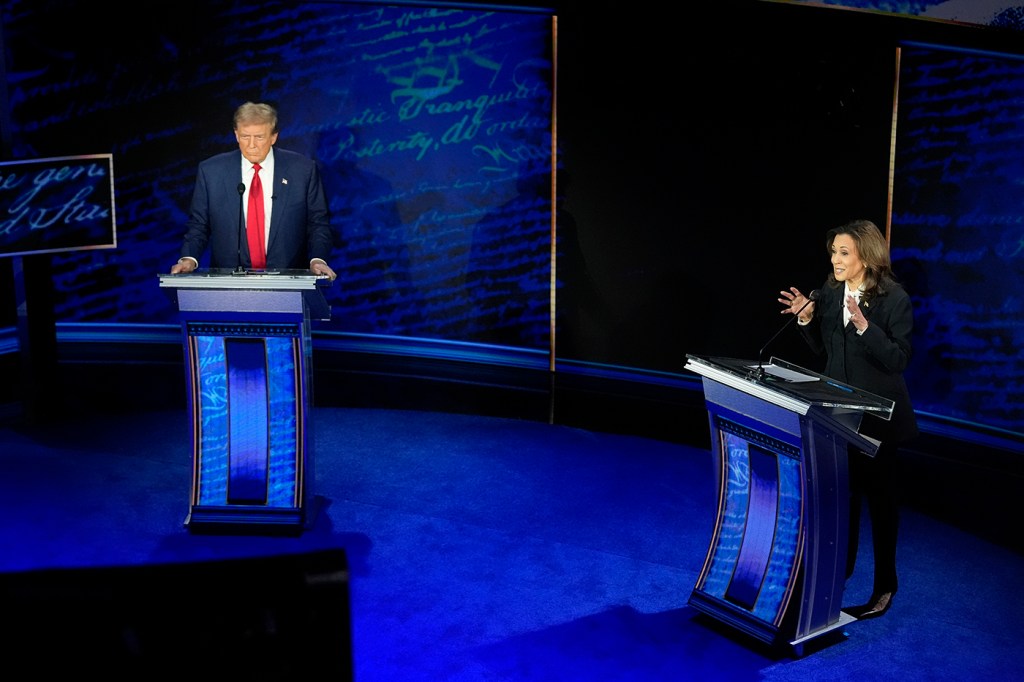Harris-Trump debate: Who came out on top? Hear what the experts had to say
Former President Donald Trump and Vice President Kamala Harris took to the debate stage Tuesday. Here’s what our experts had to say about their performance.

The first and perhaps only presidential debate between former President Donald Trump and Vice President Kamala Harris is in the books.
The pair took to the debate stage Tuesday in what Northeastern University political experts said was a clear contrast of style, policy and vision that saw both candidates tested in different ways.
“Harris is clearly trying to channel authority, gravity and maturity — and I think she did that quite well,” says Martha Johnson, an associate professor of government at Northeastern.
It was the first debate after the 2024 election took an abrupt turn in July when President Joe Biden dropped out of the race following his disastrous debate performance the month prior.
The debate was hosted by ABC News and held in Philadelphia. It comes as the race for the White House tightens, with the latest polls showing Harris and Trump within 1 percentage point of each other.
Editor’s Picks
Nick Beauchamp, an associate professor of political science at Northeastern who maintains an election aggregator, says Harris’ strategy seemed to be twofold.
“First, to differentiate herself from Trump, and second, to bait and anger him in order to provoke unappealing rants,” Beauchamp says.
Similar to Trump’s debates against Hillary Clinton in 2016, Johnson says that the gender dynamics were notable from the outset.
“The split screen and the angle of the camera works to Harris’ advantage,” Johnson says. “She is a short woman, and Trump is quite tall. Often in politics, height matters. With the split screen, they appeared to be the same height and size, increasing her gravitas.”
Johnson says she thought that Harris cast as broad a net as possible, presenting herself as a president for everyone.
“She downplayed any controversial positions,” Johnson says, “and really tried to focus on a general message of stability, freedom and forward progress, with a focus on families, working class and small businesses.”
“She has clearly prepared a series of topics she knows he is sensitive about, and kept these jibes coming even if they are not central to the audience’s concerns, because they provoke Trump into displaying his angry side,” Beauchamp says.
The rules for the debate were similar to the rules in the Trump-Biden debate, with microphones muted while the other candidate spoke.
Highlights and lowlights
Harris began by laying out a vision of what she called an “opportunity economy,” while attacking what she characterized as a “Trump sales tax” on the middle class. What she was referring to is Trump’s plan to raise more tariffs on imported goods, which he defended, noting that Biden largely left his tariffs in place.
In the early going, Harris also referred to Project 2025, a sweeping plan to overhaul the federal government. Trump denied any involvement with the project, which was conceived by the conservative think tank the Heritage Foundation.
“This was a group of people that came up with some ideas — some good, some bad — but it makes no difference,” Trump said, noting that he’s an “open book.”
The issue of abortion prompted a prolonged exchange between the candidates. Moderator Linsey Davis at one point stepped in to refute Trump’s false claim that some states permit the killing of a baby after birth.
Asked if she would support any restrictions on abortion, Harris said that she supports “reinstating the protections of Roe v. Wade.”
“Nowhere in America is a woman carrying a pregnancy to term and then asking for an abortion — that is insulting to the women of America,” she said.
The moderators questioned Harris on why many of her policy positions have changed, and pressed Trump about whether he had any regrets in relation to the Jan. 6 attacks on the U.S. Capitol.
“Of all Trump’s responses, the most disturbing to me was his response to questions about January 6,” Johnson says. “Not only was it factually inaccurate to say that no people on the other side died, but that is a very disturbing criteria by which to judge whether January 6 was peaceful.”
By the one-hour mark, the candidates were questioned on their stances on the Israel-Hamas war. Russia’s war in Ukraine came next, which prompted a lengthy dialogue about foreign policy and diplomacy. The evening concluded with a discussion of the candidates’ plans to combat climate change.
How will the debate change the poll numbers?
Historically, presidential debates have had little impact on voters’ preferences. David Lazer, Northeastern distinguished professor of political science and computer sciences, expects Tuesday’s showdown to have the same negligible effect.
“Even with the last one, the polls didn’t move much,” Lazer says. “It was clearly an epic failure by Biden — and Democratic Party elites certainly panicked — but the reality is the polls didn’t budge much.”
That’s because Lazer says that party support, at this late stage, is pretty well-secured.
“If there’s a real stake here it’s that there’s still a fair number of people who don’t have much of an opinion on Harris, and so for some voters this [is] their first introduction to her,” he says.












